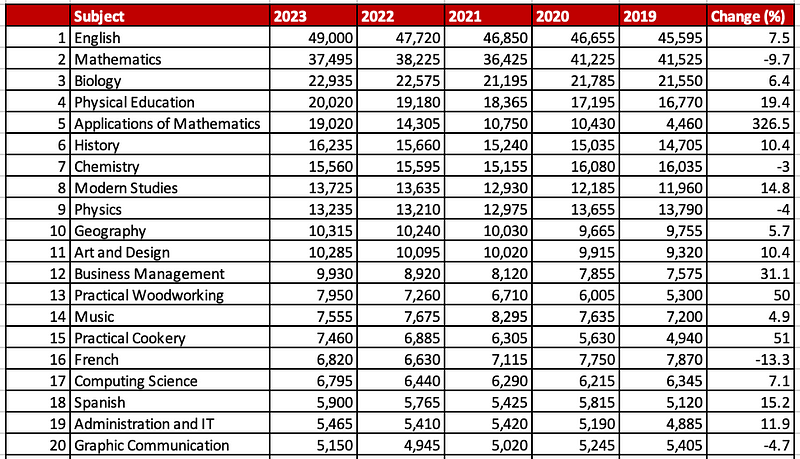Is Computer Science at School a Science?

Is Computer Science at School a Science?
Let me start with my viewpoint. To me, every child at school should learn coding, and, every child should know about the famous computer scientists/engineers, such as Claude Shannon, Richard Stallman and Daphne Koller, as much as they know about Newton and Galileo. In fact, these amazing researchers have changed our world in more ways than we can ever imagine.
And, so, in Scotland, the subject “Computer Science” has hardly advanced over the past years, and it is well behind the other traditional science subjects of Biology, Physics and Chemistry. It is still, too, dominated by male pupils with over 80% of the class being male.
But, what the problem?
Well there are many reasons, but one of the most fundamental is that the subject doesn’t really know what it wants to do, and where “Computer Science” is not really a proper science. It doesn’t cover the science behind AI or cryptography, it basically ends up being a superficial look at information technology. The subject looks as if it was designed by a committee, and less by a leader in the field. It avoids fundamentals that we would see in other science disciplines, and ends up not knowing what it should do. Thus it has never really showed its potential. A focus on the fundamentals of AI, or in understanding cryptography, would have certainly given it more credability in its standard.
Overall, if it wants to be computer programming, then let it be called “Computer Programming”, and drop the science. If it is “Computer Science”, then let it be a proper science and be based on the principles of our great scientific work in the field. And, if it is teaching the basics of Information Technology, then call it, “Information Technology”.
A science should have a base of fundamental knowledge that rarely changes, and, as a highly technical subject, Computer Science should have a base in mathematics and formalisation. As a science, too, we aim to stimulate enquiry and provide a foundation for future knowledge. A syllabus that covers the ‘here and now’ in Computing is often out of date after a year or two. A science subject, too, covers the fundamental building block that rarely age – such as, a neural network or the Diffie-Hellman method.
The following is an analysis of the N5 and Higher results in Scotland for Computer Science.
N5 qualifications
And, so, the N5 (National 5) qualification results in Scotland have been issued for 2023, and those looking to see great advancements in STEM and language subjects will be slightly disappointed, with Computer Science showing only a 7.1% increase between 2019 and 2023, while Physics and Chemistry have dropped.
The strongest performance for changes were in areas of cookery (up 51%), woodwork (up 50%) and metalwork (up 35.2%). One great advancements is the overall increase in Maths (for Mathematics and Applications of Mathematics). Practical Cookery, Woodwork and Metalwork and have overtaken Computer Science over the past few years, and where Physical Education has moved ahead of most of the science subjects. For languages, Spanish seems to be holding on fairly (possibly due to Spain being popular as a holiday destination) but French, German and Italian all show drops:


Highers
For Highers, Maths and English show small increases, but it is Physical Education and Modern Studies that show the most impactful changes. Computer Science has increased by 10.1% between 2019 and 2023, but Chemistry falls by 3.6% and Physics falls by 4%. While Biology also falls, the demand for Human Biology has more than offset this. Overall, Biology seems to be in a healthy state. The greatest worry, though, is that language subjects are dropping significantly, with only Spanish making it into the Top 20 (but still falling from 2019.


Gender balances
The root of the lack of female graduates in technology perhaps goes back to school. If we take the gender balance for the mainly male-dominated subjects in 2023, we see that Computer Science has registrations at N5 that have three times more male than female candidates. We also see that Physics is also strongly biased toward male candidates:

Physical education, too, seems to have strongly biased towards the male gender. For female-biased subjects, we see that languages and the creative arts are the most popular, with Biology being the most strong female-oriented science subject:

But, it gets even worse at Higher levels, and where the gender bias in Computer Science increases to more than four males to one female in classes (81.2%). Overall, Computer Science moves from 78.4% to 81.2%, and Physics from 71.6% to 73.8% — for male/female gender balance:

Conclusions
Our next generation need to understand some of the key problems in the building of our flawed digital world, and learning about what a pixel is, will not take them there. I hope we can advance computer science as a science and also enable programming for all. The two need to be separated… one is academic, and the other is a practical skill. Or, keep the science until college and university and just focus on programming skills for all.
To me, to try and do both, just doesn’t work!
I just hope for the future, we can find something that builds the tech base of the future and get kids into the wonderful world of computer science- few disciplines can cover so many job titles.